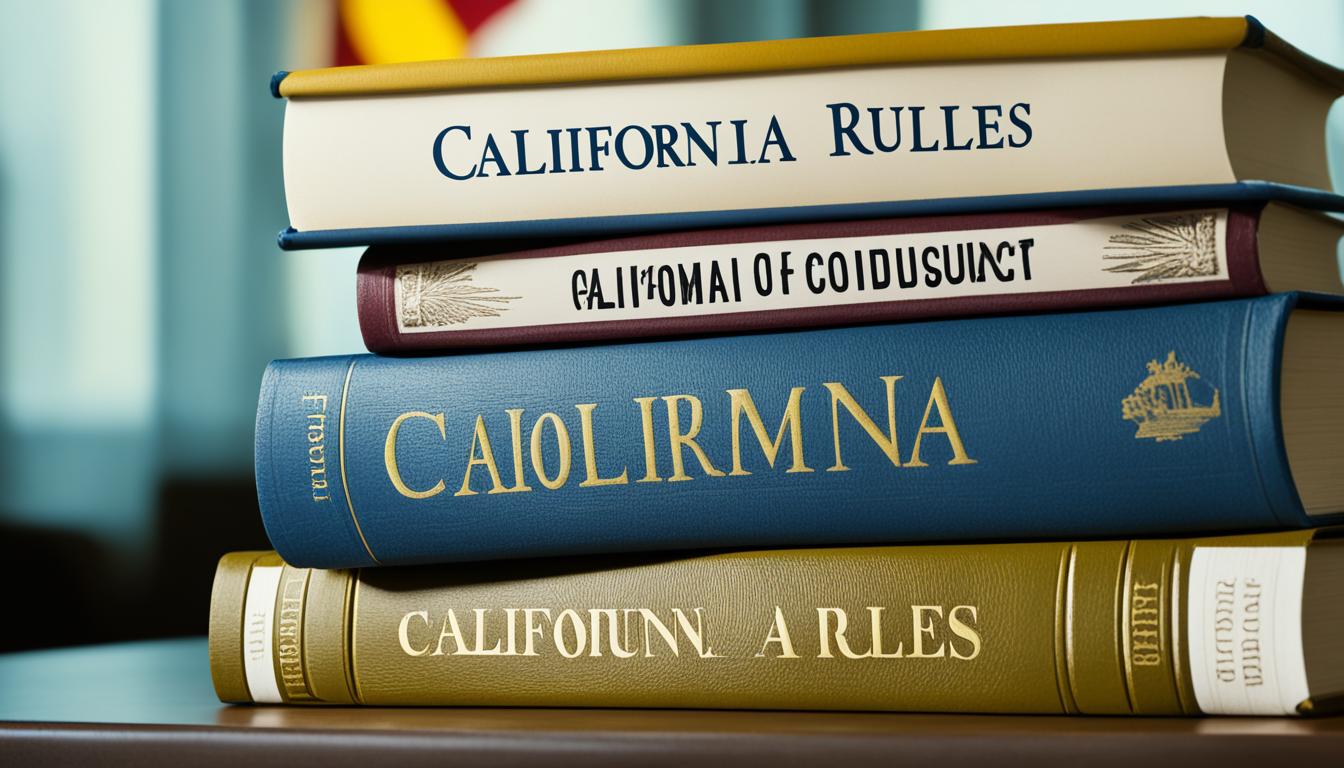The California Rules of Professional Conduct (CRPC) set clear guidelines for lawyers in California. They were made by the Board of Trustees and approved by the California Supreme Court. These rules help protect the public and keep the legal profession respected.
All lawyers in California must follow the CRPC. These rules and standards are the base for ethical behavior and responsibility in the legal field. By knowing and following the CRPC, lawyers keep their conduct high. This helps protect the legal system’s integrity and builds trust with clients.
The CRPC talk about many things. This includes how lawyers should talk to clients and handle complex issues like conflicts of interest and keeping secrets. California’s rules are unique, blending with national standards and addressing local legal issues.
By learning about the California Rules of Professional Conduct, lawyers can serve their clients better. This guide will cover the CRPC’s main points. It helps lawyers act ethically and keep the public’s trust in the legal system.
Introduction to the California Rules of Professional Conduct
The California Rules of Professional Conduct set the ethical rules for lawyers. They were approved by the California Supreme Court on May 10, 2018. They went into effect on November 1, 2018. These rules help guide lawyers in the state.
Purpose and Function of the Rules
The main goal of the California Rules of Professional Conduct is to keep the legal profession ethical. These rules give clear guidelines for lawyers. They help lawyers know their duties to clients, the law, and the public.
By following these rules, lawyers can handle tricky situations. They keep the legal profession honest.
Recent Amendments and Updates
The California Rules of Professional Conduct have seen many changes lately. These changes help with new legal issues and ethical problems. In June 2023, a new rule, Rule 8.3, made it a duty for lawyers to report if they know another lawyer is breaking the law or acting unethically.
In October 2022, rules about talking to clients and handling money were updated. Rules about being a good lawyer and working with non-lawyers were changed in February 2021.
The latest update is about using artificial intelligence in law. This rule, starting November 16, 2023, helps lawyers use AI right and ethically.
“The California Rules of Professional Conduct serve as a vital ethical framework for the legal profession, ensuring that attorneys uphold the highest standards of conduct in their practice.”
Lawyer-Client Relationship
The lawyer-client relationship is key in the legal world. It’s built on trust, good communication, and hard work. California’s Rules of Professional Conduct (CRPC) set clear rules for lawyers to follow.
Duty of Diligence (Rule 1.3)
CRPC Rule 1.3 says lawyers must work hard and quickly for their clients. They need to be committed and not delay things. Lawyers should tell their clients what’s happening and answer their questions quickly.
Duty of Communication (Rule 1.4)
Talking well is key in the attorney-client relationship. CRPC Rule 1.4 says lawyers must keep clients updated and answer their questions. They should explain things in a way clients can understand. This helps clients make good choices about their legal issues.
Good communication between lawyers and clients is very important. A study by the State Bar of California found that not talking enough was the top complaint. The new CRPC rules in 2018 made lawyers’ communication duties clearer, the first big change in 30 years.
Keeping things open and clear is key for a strong attorney-client relationship. It helps with good legal advice and solving legal problems well.
Conflicts of Interest and Confidentiality
The California Rules of Professional Conduct (CRPC) set clear rules for lawyers. These rules cover managing conflicts of interest and keeping client info secret. They help keep the lawyer-client relationship strong and honest.
Conflicts of Interest (Rule 1.7 – Conflict of Interest: General Rule)
Rule 1.7 says lawyers can’t work for a client if it could hurt their work. This happens if their own interests or another client’s could get in the way. It means they might not be able to do their job well.
- The new CRPC, starting November 1, 2018, let lawyers work with clients who might have conflicting interests. But, they must tell all clients and get their okay in writing.
- There are two kinds of conflicts lawyers can’t get out of. One is when they can’t get permission from all clients. The other is when they can’t work for anyone, even with permission.
- Lawyers must think they can work for all clients fairly, based on clear standards.
- Just getting permission isn’t enough if it would stop a lawyer from doing a good job for all clients.
Confidentiality (Rule 1.6 – Confidentiality of Information)
Rule 1.6 says lawyers must keep all client info secret, unless there’s a good reason not to. They can’t share client info without the client’s okay, unless it’s needed for the case or by law.
| Key Aspects of Confidentiality | Description |
|---|---|
| Confidentiality Obligations | Lawyers must keep all client info secret, unless there’s a good reason not to. |
| Client Authorization | Lawyers can share client info if the client says it’s okay, in writing. |
| Implied Necessity | Lawyers can share client info if it’s clearly needed for the case. |
| Legal Exceptions | Lawyers can share client info if the law says they can, like to stop a crime that could cause serious harm. |
Keeping up with conflicts of interest and attorney-client confidentiality is key. It helps keep the legal profession in California trusted and respected.
California Rules of Professional Conduct
The California Rules of Professional Conduct set the rules for lawyers and paralegals in the state. They started on January 1, 2015. These rules help keep the legal profession ethical by having a disciplinary process.
The Board of Governors of the State Bar of California made these rules. The Supreme Court of California also approved them. Breaking these rules on purpose can lead to disciplinary action.
These rules talk about many things. This includes how lawyers and clients work together, avoiding conflicts, keeping secrets, being good at your job, and how you get paid. They also cover being honest, duties to past clients, and following the law.
In 2018, the California Supreme Court said yes to 69 Rules of Professional Conduct. This meant 27 new rules and big changes to 42 old ones. This shows how the legal world changes and we need new rules to keep up.
Rule 8.3, or the “lawyer rat rule,” started on August 1, 2023. It says lawyers must tell on other lawyers who do bad things. This includes things like criminal acts or taking money or property.
These rules are key for the legal community. They make sure lawyers and paralegals act professionally. This helps keep trust in the legal system.
“The Rules of Professional Conduct are not intended to create new civil causes of action.”
Competence and Fee Arrangements
The California Rules of Professional Conduct (CRPC) stress the need for lawyer skill and fair fees. Rule 1.1 says lawyers must have the knowledge and skills to do their job well. This means they need to be knowledgeable, thorough, and ready for legal work.
Competence
Rule 1.1 lets lawyers work with or get advice from other skilled lawyers. They can also learn new skills before starting a case. Or, they can pass the case to another lawyer who knows the law.
In emergencies, lawyers can help even if they’re not fully skilled. This is okay for urgent situations.
Fees
CRPC Rule 1.5 covers how lawyers charge fees and make agreements with clients. Lawyers must explain fees clearly. The rule says no to unfair or illegal fees. It looks at the fee’s size, the work done, and if the client agreed to it.
Lawyers must put fees in trust accounts and give back any unearned money if they stop working with a client.
| Fee-Related Provisions | Key Details |
|---|---|
| Unconscionability Standard | California uses the “unconscionability” standard for banned fees, unlike many places that use “unreasonable fee”. |
| Contingent Fees | Proposed Rule 1.5 says no to contingent fees in family law and criminal cases. |
| “Earned on Receipt” Fees | Paragraph (d) stops calling a fee “earned on receipt” or “nonrefundable”, unless it’s a true retainer fee. |
| Flat Fees | Paragraph (e) lets for flat fees if the lawyer does what they agreed to. |
These rules help protect clients and make sure fees are fair in California’s legal world.
Candor and Truthfulness
The California Rules of Professional Conduct (CRPC) stress the importance of candor and truthfulness in how lawyers act with courts and others. These rules help keep the legal system honest and build trust with the public.
Candor Toward the Tribunal (Rule 3.3)
CRPC Rule 3.3 tells lawyers to be candor with courts and legal bodies. They must tell the truth in their statements. Lawyers can’t lie, hide lies, or use false evidence. They must also share any legal facts that go against their client’s case.
In cases where only one side is heard, lawyers must tell the court everything they know. If they find out about illegal or dishonest actions linked to the case, they must act. This could mean explaining the situation or asking to leave the case.
Truthfulness in Statements to Others (Rule 4.1)
CRPC Rule 4.1 talks about being honest in what lawyers say to others. It says lawyers can’t lie or make false claims to people outside of court. This rule helps stop lawyers from helping with illegal or dishonest acts.
There are some exceptions to what lawyers must share, but they are few. Business and Professions Code §6068(e)(1) protects client secrets. But, Rule 4.1 and other laws can make lawyers liable for not telling the whole truth or staying silent when they should speak up.
Lawyers need to know what facts are important when negotiating. Saying less than the truth or hiding key details can break Rule 4.1.

Keeping up with attorney candor and truthfulness in statements is key. It keeps the public trusting the legal system and ensures fair trials. By following these rules, lawyers do their job well and help justice be served.
Duties to Former Clients and the Legal System
Attorneys must know their duties to former clients and the duties to the legal system. The California Rules of Professional Conduct (CRPC) guide them. They tell what’s expected of them.
Duties to Former Clients
CRPC Rule 1.9 talks about what lawyers can and can’t do with their former clients. They can’t work against a former client’s interests in a similar case without permission. This rule keeps client secrets safe and stops lawyers from using what they know against their former clients.
If a lawyer breaks this rule, they could face big trouble. Clients can sue or report them to the California State Bar. The Bar can take action against them.
Duties to the Legal System
CRPC Rule 3.4 tells lawyers how to act fairly in court. They must not block another party from getting evidence or hide important documents. They also can’t lie about the law or facts in court.
Following these rules keeps the legal system fair and honest. If lawyers don’t, they could lose their license or even face criminal charges.
By following their duties to former clients and their duties to the legal system, lawyers show they’re committed to doing their job right. This helps keep the public’s trust in lawyers.
| Duty to Former Clients | Duty to the Legal System |
|---|---|
|
|
The California Rules of Professional Conduct help lawyers know what’s right. They keep the legal profession honest and trusted.
“The attorney must maintain client confidences even after the death of the client, as per Evidence Code Section 953.”
Advertising and Solicitation Rules
The California Rules of Professional Conduct have rules for attorney advertising and solicitation. These rules help lawyers stay ethical in their marketing and reaching out to clients.
These rules started on November 1, 2018. They were approved by the California Supreme Court in May of that year. Rules 7.1 through 7.5 cover what ads can say, what you can’t do in solicitation, and using client testimonials.
Rule 7.2 says ads must list a lawyer’s name and address. Some ads need to say “advertisement” or “solicitation.” Rule 7.3 says you can’t ask for clients in person, over the phone, or online for money.
To follow these rules, check your ads for truth, train your staff, and make sure your marketing is professional and honest. Working with a marketing agency that knows the rules can save you time. It also helps promote your legal services in California.
| Rule | Key Provisions |
|---|---|
| Rule 7.1 | Truthfulness in Communications |
| Rule 7.2 | Advertising |
| Rule 7.3 | Solicitation of Clients |
| Rule 7.4 | Communication of Fields of Practice and Specialization |
| Rule 7.5 | Firm Names and Letterheads |

Following these rules helps California lawyers advertise and reach out to clients in a good way. It keeps the legal profession honest and respected.
Trust Account Management and Recordkeeping
In California, managing client trust accounts and keeping detailed records is key for lawyers. The California Rules of Professional Conduct stress how important these tasks are. Many lawyers in the state handle trust accounts.
Not managing client trust accounts right can lead to big problems. This includes losing your law license. The California State Bar’s Client Trust Account Protection Program (CTAPP) makes lawyers register their trust accounts yearly. This keeps everyone honest and clear.
Lawyers must follow strict rules for keeping client money safe, as stated in Rule 1.15 of the California Rules of Professional Conduct. They need to keep accurate records, like trust and client ledgers, and do monthly checks. They also must keep bank statements and other financial papers.
Many lawyers use tools like TrustBooks for easier record-keeping. These tools help with trust accounting and make sure lawyers follow the state’s strict rules. By focusing on trust account management and keeping good records, California lawyers can protect their clients and follow the law.
“Proper management of client trust accounts is a critical responsibility for California attorneys, as mishandling these funds can lead to severe disciplinary consequences.”
In summary, the California Rules of Professional Conduct give a clear guide for lawyers to handle client trust accounts and keep records. Following these rules helps lawyers protect their clients, keep their good name, and avoid big problems from trust account mistakes.
Disciplinary Procedures and Consequences
The California Rules of Professional Conduct have a strict system. It’s run by the State Bar of California. If lawyers don’t follow these rules, they could face actions like private or public reproval, suspension, or even losing their license. This system keeps the legal field honest and protects everyone.
In 2020, the State Bar looked into almost 17,500 cases of attorney discipline. This means about 1% of all lawyers in California. That year, 180 lawyers faced charges in court, and 79 lost their licenses. Another 114 were suspended.
The process to discipline lawyers needs strong evidence, not just proof beyond doubt. There’s no time limit for these cases. Last year, the State Bar got over 12,000 complaints, which is 9% less than before. And 425 cases went to court.
| Disciplinary Measure | Frequency in 2020 |
|---|---|
| Disbarments | 79 |
| Suspensions | 114 |
| Complaints Filed | 12,000 (9% decrease from prior year) |
| Cases Filed in State Bar Court | 425 |
Breaking the rules can lead to serious consequences for lawyers. They could face actions that hurt their careers and affect their clients. It’s important for lawyers to always act professionally to keep trust with the public.
“The disciplinary process is intended to maintain the integrity of the legal profession and protect the public.”
Resources and Further Reading
For the latest info on California Rules of Professional Conduct, check out the official website of the State Bar. It has the full rules, including new changes.
The California State Bar Act is in the Business & Professions Code. It has key rules for lawyers in the state. It’s a great extra source for lawyers looking for more additional resources and further information on legal ethics in California.
California lawyers might want to look at the California Bar Ethics Opinions too. They give detailed advice on many ethical issues lawyers face. These opinions help clarify how to follow the Rules of Professional Conduct in real situations.

